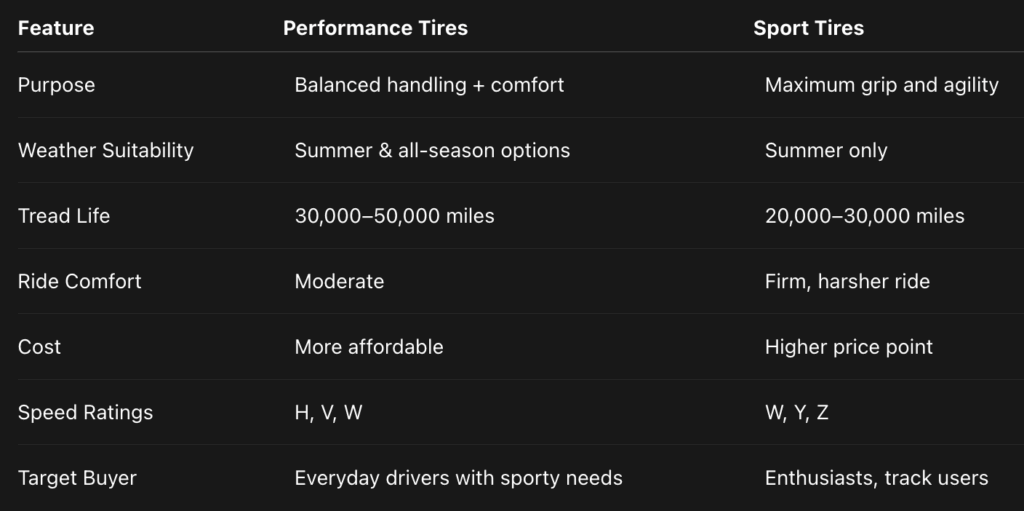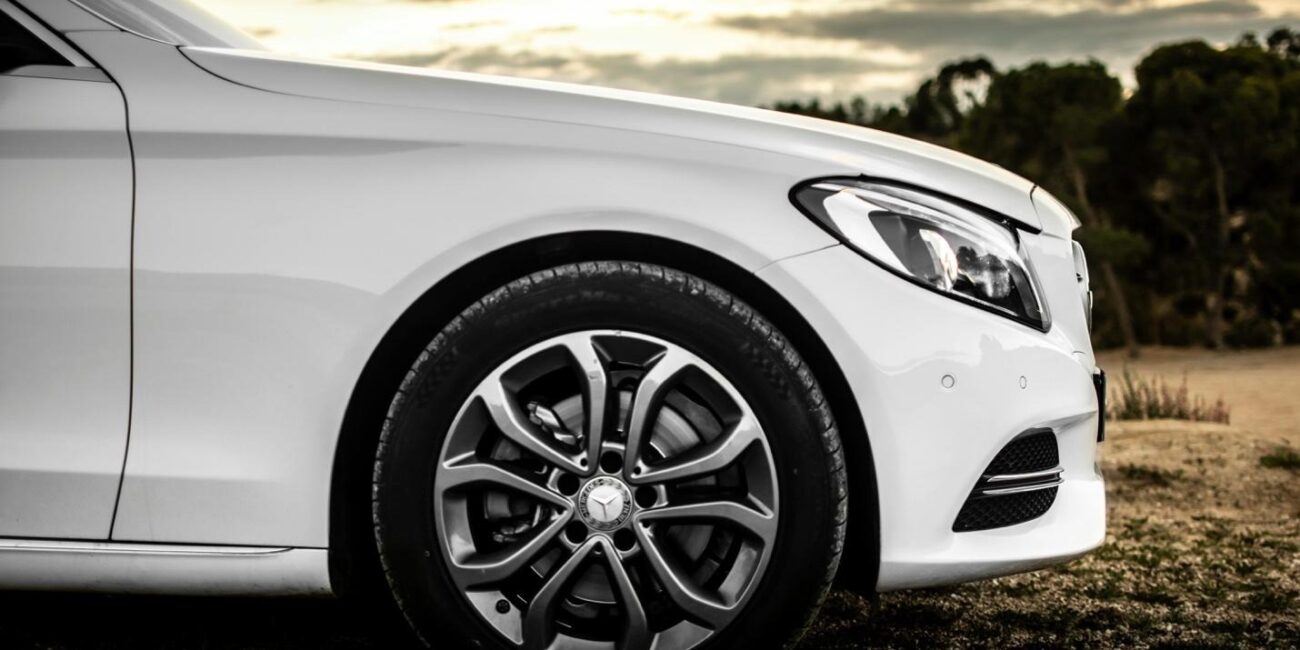Car buyers often face confusion when shopping for new tires: Are performance tires the same as sport tires? While the terms are sometimes used interchangeably by retailers, they aren’t identical. Performance tires generally cover a broad category of tires designed for improved handling and speed, while sport tires are often a sub-type that focuses even more specifically on high-speed agility and cornering. This article explains the key differences, pros and cons, buyer tips, and common mistakes so you can choose the right option with confidence.
What Are Performance Tires?
Performance tires are designed to offer better handling, braking, and overall responsiveness compared to standard or touring tires. They’re commonly found on sports cars, sedans, and even performance-oriented SUVs.
Key Features:
- Softer rubber compounds for grip.
- Wider tread design to increase road contact.
- Stiffer sidewalls for better stability.
- Available in summer, all-season, and ultra-high-performance variants.
Quick Answer: Performance tires balance sporty handling with daily drivability, making them versatile for many drivers.
What Are Sport Tires?
Sport tires are often considered a subset of performance tires but lean further toward aggressive handling. They’re typically optimized for high-speed stability, sharper cornering, and track-like driving feel.
Key Features:
- Aggressive tread patterns for maximum traction.
- Often limited to summer compounds (not built for cold or snow).
- Shorter tread life compared to general performance tires.
- Higher speed ratings (W, Y, or Z).
Quick Answer: Sport tires are essentially high-performance tires with a sharper focus on agility, designed for enthusiasts and spirited drivers.
Main Differences Between Performance and Sport Tires
1. Purpose
- Performance Tires: Broader focus, balancing daily use and sporty handling.
- Sport Tires: Narrower focus, maximizing grip and agility for spirited driving.
2. Weather Suitability
- Performance Tires: Available in summer and all-season versions.
- Sport Tires: Usually summer-only, not recommended for winter use.
3. Lifespan
- Performance Tires: Typically last 30,000–50,000 miles.
- Sport Tires: Wear faster, often 20,000–30,000 miles.
4. Comfort vs Agility
- Performance Tires: Balanced ride with responsive handling.
- Sport Tires: Firmer ride, prioritizing agility over comfort.
5. Cost
- Performance Tires: More affordable, especially in all-season options.
- Sport Tires: Higher cost due to specialized compounds and designs.
Pros and Cons of Performance Tires
Advantages
- Versatile for daily driving and spirited use.
- Longer tread life than sport-specific tires.
- Available in all-season versions for mild winter conditions.
- Good balance of comfort and control.
Disadvantages
- Less ultimate grip compared to sport tires.
- Not as precise in cornering at higher speeds.
Pros and Cons of Sport Tires
Advantages
- Maximum grip and cornering performance.
- Faster steering response.
- Shorter braking distances on dry roads.
- Ideal for enthusiasts and high-speed drivers.
Disadvantages
- Shorter tread life.
- Poor performance in cold or snowy weather.
- Harsher ride quality.
- Higher purchase cost.
Tire Ratings That Matter
Understanding tire ratings helps buyers compare performance vs sport options:
- UTQG Treadwear: Sport tires often have lower ratings (200–300), meaning shorter life, while performance tires may range 300–500.
- Traction Grades: Both generally rate A or AA, showing strong wet braking.
- Temperature Ratings: Crucial for high-speed driving; sport tires often excel here.
- Speed Ratings: Sport tires typically carry higher ratings (W, Y, Z) than general performance tires (H, V, W).
Buyer POV: If you push your car hard, prioritize traction and temperature ratings over treadwear.
Myths vs Facts
- Myth: Sport tires and performance tires are the same.
Fact: Sport tires are a subcategory with a sharper focus on grip and agility. - Myth: Sport tires make your car faster.
Fact: They don’t add horsepower; they help you corner and stop faster. - Myth: Performance tires can handle all weather.
Fact: Only all-season performance tires can; most sport tires are summer-only.
Buyer Mistakes to Avoid
- Choosing sport tires for daily commuting: They wear out quickly and reduce comfort.
- Using sport tires in cold climates: Unsafe, as rubber hardens below 45°F.
- Mixing sport and performance tires: Causes uneven handling and instability.
- Ignoring speed ratings: Driving beyond rated speeds risks blowouts.
Who Should Buy Performance Tires?
Performance tires are ideal for:
- Drivers who want better handling than standard tires without extreme trade-offs.
- Buyers in areas with mixed climates who benefit from all-season performance options.
- Daily commuters who occasionally enjoy spirited driving.
- EV or hybrid drivers who want a balance of grip and efficiency.
Who Should Buy Sport Tires?
Sport tires are best suited for:
- Enthusiasts who prioritize agility and cornering.
- Drivers in warm climates with no winter conditions.
- Weekend racers or track day participants.
- Owners of cars designed for high performance.
Common Buyer Questions (FAQ)
Are sport tires the same as performance tires?
No. Sport tires are a type of performance tire but are more aggressively tuned for grip and agility.
Do sport tires make a car faster?
Not in horsepower, but they improve cornering speed and responsiveness, making the car feel faster.
Can I use sport tires year-round?
Only if you live in a warm climate. In freezing temperatures, they harden and lose grip.
Which lasts longer: performance or sport tires?
Performance tires generally last longer due to less aggressive compounds.
Are performance tires worth it for daily driving?
Yes, they balance comfort, safety, and handling better than sport tires.
Can I mix sport and performance tires on the same car?
No. Mixing tire types affects stability and grip; always use a matched set.
Quick Comparison Table

Real-World Scenarios
- City Commuters: Performance tires offer comfort with reliable handling.
- Weekend Drivers: Sport tires deliver excitement on twisty roads.
- Highway Drivers: Performance tires save fuel and last longer.
- Hot Climate Enthusiasts: Sport tires maximize grip in warm conditions.
- EV Owners: Performance tires provide grip without draining range, while sport tires suit high-performance EVs.
Conclusion
While performance tires and sport tires share similarities, they serve slightly different purposes. Performance tires are versatile, offering a balance between comfort, longevity, and agility. Sport tires push harder toward grip and speed, making them ideal for enthusiasts who prioritize performance above all else.
Bottom line: Choose performance tires for everyday driving with a sporty edge. Choose sport tires if you want maximum agility and don’t mind sacrificing comfort and tread life.
Next step: Consider your driving style, climate, and budget before deciding which tire category suits your needs.



